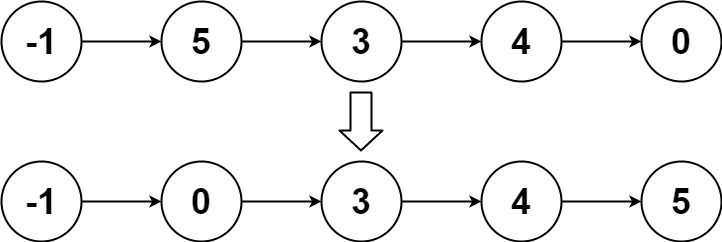Given the head of a linked list, return the list after sorting it in ascending order.
Follow up: Can you sort the linked list in O(n logn) time and O(1) memory (i.e. constant space)?
Example 1:
Input: head = [4,2,1,3] Output: [1,2,3,4]
Example 2:
Input: head = [-1,5,3,4,0] Output: [-1,0,3,4,5]
Example 3:
Input: head = [] Output: []
Constraints:
- The number of nodes in the list is in the range
[0, 5 * 104]. -105 <= Node.val <= 105
# Definition for singly-linked list.
# class ListNode:
# def __init__(self, val=0, next=None):
# self.val = val
# self.next = next
class Solution:
def sortList(self, head: ListNode) -> ListNode:
if head is None or head.next is None:
return head
slow, fast = head, head.next
while fast and fast.next:
slow, fast = slow.next, fast.next.next
t = slow.next
slow.next = None
l1, l2 = self.sortList(head), self.sortList(t)
dummy = ListNode()
cur = dummy
while l1 and l2:
if l1.val <= l2.val:
cur.next = l1
l1 = l1.next
else:
cur.next = l2
l2 = l2.next
cur = cur.next
cur.next = l1 or l2
return dummy.next/**
* Definition for singly-linked list.
* public class ListNode {
* int val;
* ListNode next;
* ListNode() {}
* ListNode(int val) { this.val = val; }
* ListNode(int val, ListNode next) { this.val = val; this.next = next; }
* }
*/
class Solution {
public ListNode sortList(ListNode head) {
if (head == null || head.next == null) {
return head;
}
ListNode slow = head, fast = head.next;
while (fast != null && fast.next != null) {
slow = slow.next;
fast = fast.next.next;
}
ListNode t = slow.next;
slow.next = null;
ListNode l1 = sortList(head);
ListNode l2 = sortList(t);
ListNode dummy = new ListNode(0);
ListNode cur = dummy;
while (l1 != null && l2 != null) {
if (l1.val <= l2.val) {
cur.next = l1;
l1 = l1.next;
} else {
cur.next = l2;
l2 = l2.next;
}
cur = cur.next;
}
cur.next = l1 == null ? l2 : l1;
return dummy.next;
}
}

